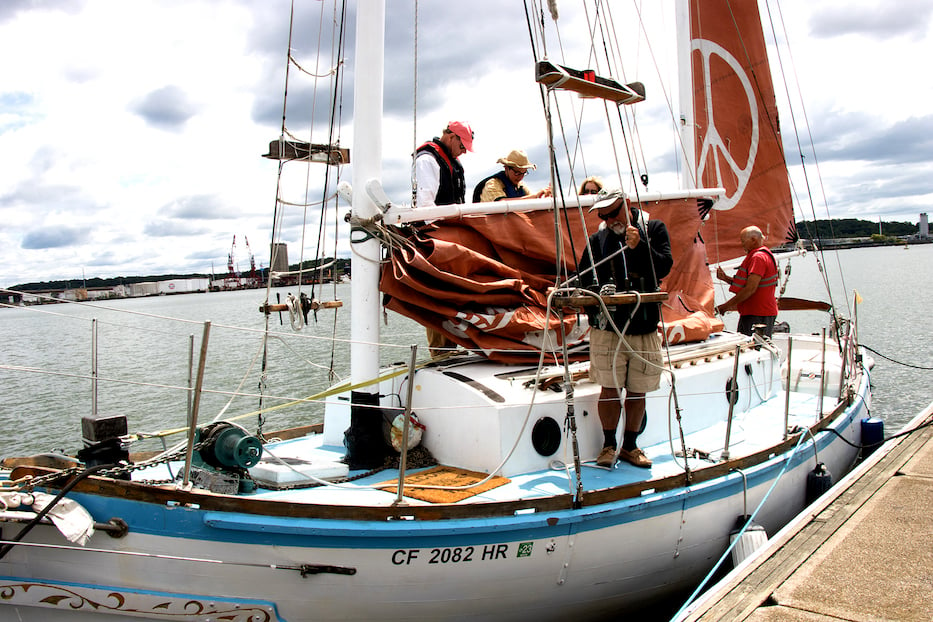
Citizen Contributions | New Haven Peace Commission
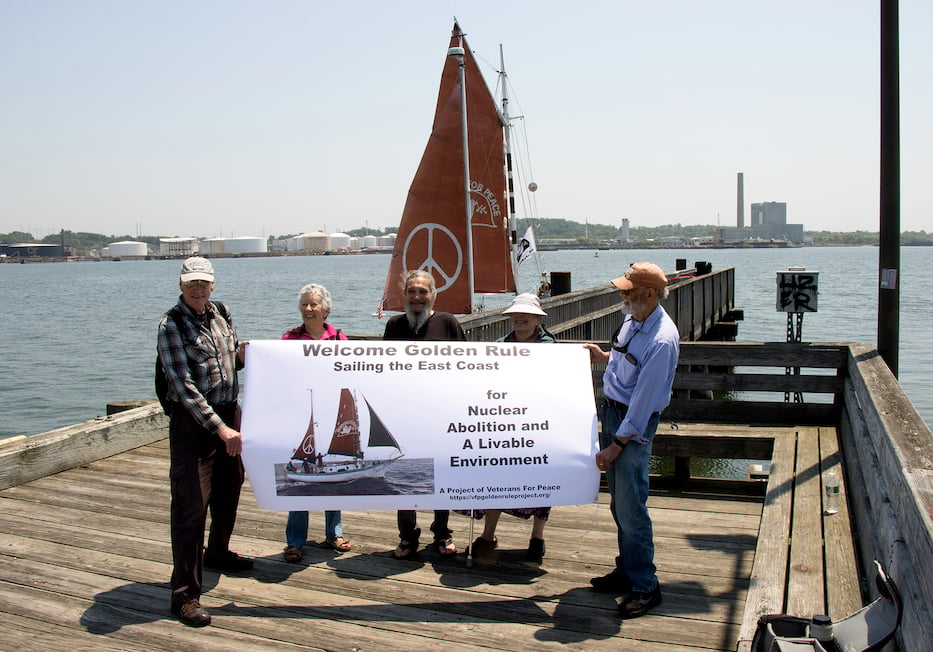
Contributed Photos.
Millie Grenough, a member of the New Haven Peace Commission, submitted the following citizen contribution.
New Haven had the honor of hosting the Golden Rule peace boat and its crew earlier this month. To learn why it was a glorious weekend, read on.
After the U.S. dropped bombs on Hiroshima and Nagasaki, Navy officer Alfred Bigelow resigned from the Navy two months before he could have retired with pension. When Bigelow heard that the U.S. was planning to test more nuclear bombs by dropping them in the Pacific Marshall Islands, he and a group of Quakers constructed a sailboat to try to stop that action. They called the boat the Golden Rule.
Four Quaker peace activists sailed the boat toward the Marshall Islands in 1958 in an attempt to halt the atmospheric nuclear bomb testing. The U.S. Coast Guard boarded the boat in Honolulu and arrested her crew. The crew’s arrest caused an international outcry and led to worldwide demands to stop nuclear testing. In 1963 President Kennedy, the USSR and the U.K. signed the Limited Nuclear Test Ban Treaty.
After that, the boat went through various owners. In 2010 the Golden Rule sank in a gale in Humboldt Bay in Northern California and was left abandoned. When a California veteran heard that the boat was about to be burned, he and dozens of Veterans for Peace, Quakers and other volunteers spent five years restoring it.
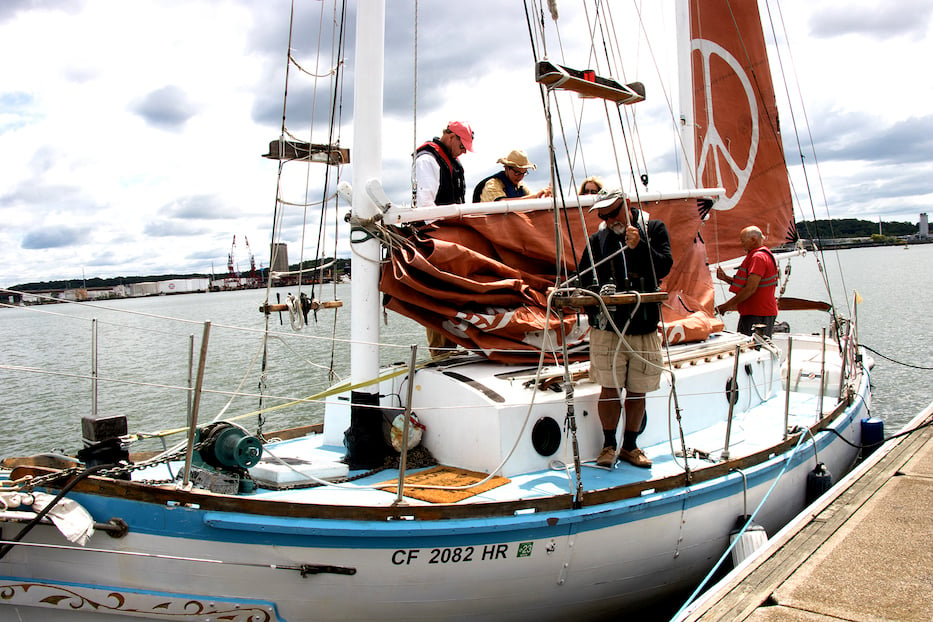
Since 2015 the Golden Rule, staffed by a rotating volunteer crew, has sailed up and down the West Coast and in the Pacific Ocean to Hawai’i, Guam and Okinawa. In each port, crew members met with locals and gave presentations wherever possible, including in schools, places of worship, and entertainment venues.
Their aim? “To show that a nuclear peace is possible, and that bravery and tenacity can overcome militarism."
On the boat's current "Great Loop Voyage," the Golden Rule traveled by truck from California to Dubuque, Iowa, home of hundreds of Marshallese immigrants. From there, crew members sailed down the Mississippi River, around Florida, to Cuba, and up the Atlantic Coast to arrive in New Haven on June 2 of this year.
On a gray Friday morning, city Director of Emergency Operations Rick Fontana and New Haven Peace Commissioners Fred Brown and Joelle Fishman arrived early at Long Wharf Pier to be on hand for the boat’s expected arrival. When they spotted the boat out in the Sound, Golden Rule Project Director Helen Jaccard waved the crew in with the peace sign. Spray from a City of New Haven Fireboat and a gaggle of geese welcomed the boat into Long Wharf Pier.
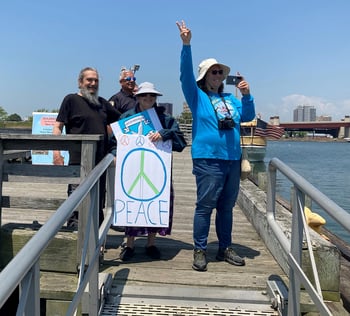 Jaccard ran down the pier to greet the crew and caught the rope to tie to the pier. New Haven peace activists beat a drum and sang out: Golden Rule crew – We welcome you! Golden Rule crew – We welcome you!
Jaccard ran down the pier to greet the crew and caught the rope to tie to the pier. New Haven peace activists beat a drum and sang out: Golden Rule crew – We welcome you! Golden Rule crew – We welcome you!
Committee of Veterans for Peace President Gerry Condon trotted from the pier parking lot to join Peace Commissioners Millie Grenough, Brown and Fishman, and Greater New Haven Peace Council member Henry Lowendorf to hold the welcome sign.
“We are perhaps closer to nuclear war than ever due to the conflict in Ukraine,” Condon said rather mournfully. Then, in a more hopeful voice, he added, “We are so happy that you in New Haven are helping us spread the word [against nuclear war].”
Crew members had a chance to enjoy food trucks on Long Wharf Drive, get some rest, and end the day with—what would you expect in New Haven?—a zesty pizza supper.
On Saturday, Clinton Robinson from New Haven-based Amistad Committee led a caravan of cars from Long Wharf Pier to the West River Peace Garden.
This site, at the intersection of Ella Grasso Boulevard and Legion Avenue, celebrates New Haven as one of the original cities worldwide named a “Peace Messenger City” by the United Nations.
Mayor Justin Elicker presented a proclamation welcoming the Golden Rule to New Haven and the Peace Garden, applauding crew members for their mission. It cited the ship’s connection with “the citizens of New Haven who passed the referendum which calls for transfer of money from weapons and wars to instead provide for human needs. Our best wishes for a successful and safe journey.”
“We are facing deep challenges in our city and in the world. We need to spend more, as a nation, on social services than we do on military,” Elicker said. “We in New Haven, because of you all – and I’m looking at a lot of our elders that are here today – because of you all constantly calling out our leaders to ensure that we are investing more in the people that are most vulnerable, we can move this forward.”
“For us to be here, as a symbolic safe harbor for the Golden Rule and to welcome you into our port is an honor for us,” Elicker added, handing the proclamation to Jaccard.
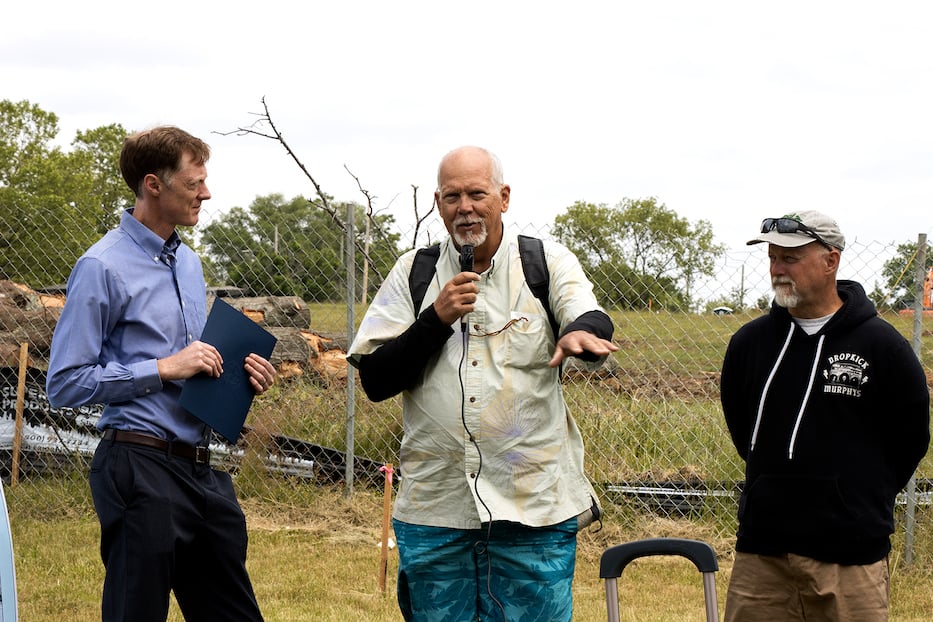
Captain Johnston-Kitazawa and First Mate Bill Good exchanged stories with the crowd. Johnston-Kitazawa recalled a Hawaiian who jumped on a ship several years ago, en route to New Haven. He returned to Hawai’i with missionaries.
“I’m here a century later on a reverse trip,” he said. “Hawai’i [is] bringing a message to your place. Hawai’i was a neutral country, and now it’s occupied and administered by the United States. I share ancestry with the people of Guam, which is often described by American military leaders as ‘America’s floating aircraft carrier.’”
"You’re not supposed to put civilians on your warships … the missionaries said ‘Peace, love your neighbor.’ We’re returning the message. Thank you for giving us the safe haven.”
First Mate Bill Good, a middle-school science teacher who is using his summer vacation to sail on the Golden Rule, spoke next. “I thought I would get on the boat and spend the time speaking and teaching other people, but so far it’s been the other way around. I’ve done mostly learning. In every port I’ve gotten some great ideas I can take back to Ohio.”
He pointed out Amistad Catholic Worker House Co-Founder Mark Colville, who spent over a year in prison for his 2018 protest of nuclear weapons, and commended him for sharing new ideas around how to work with and assist a city’s unhoused population.
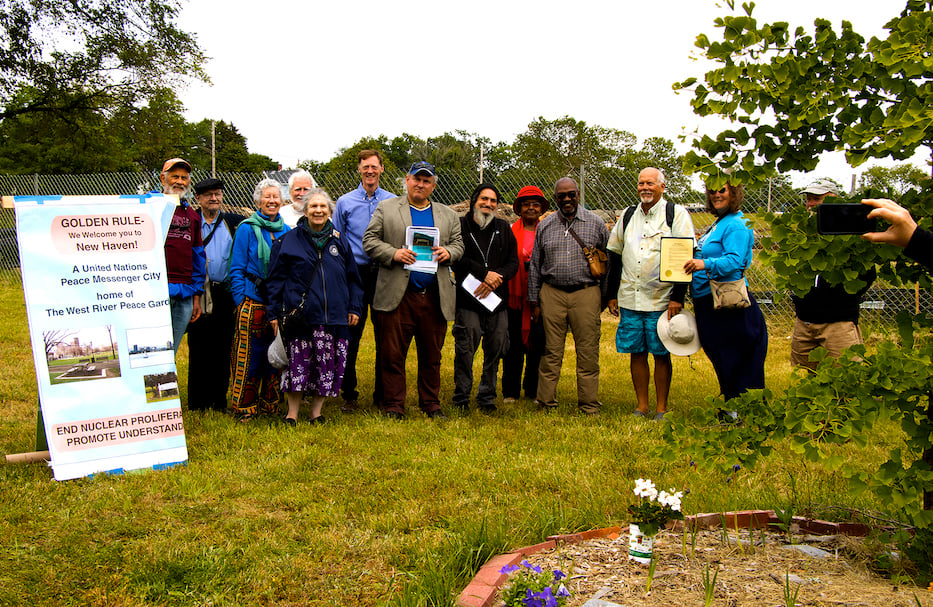
Aaron Goode spoke on behalf of the Friends of the West River Peace Garden and gave a history of the garden.
“It’s a gateway to New Haven but it’s also a symbolic gateway, a living emblem of the values of New Haven, of the leadership role that New Haven has played in the global peace movement going back more than 40 years.”
Praising the West River Neighborhood and the “countless” volunteer hours spent in the garden, he pointed to a tree on his left. “This is a gingko tree that is the genetic offspring from a gingko that survived the atomic bombing in Hiroshima. We in New Haven are the steward of this miraculous survivor.”
From the Peace Garden the caravan moved on to other peace sites: Mitchell Library, where the Peace Commission planted a Peace Tree in 2014; the Botanical Garden of Healing; and Trowbridge Square in the Hill.
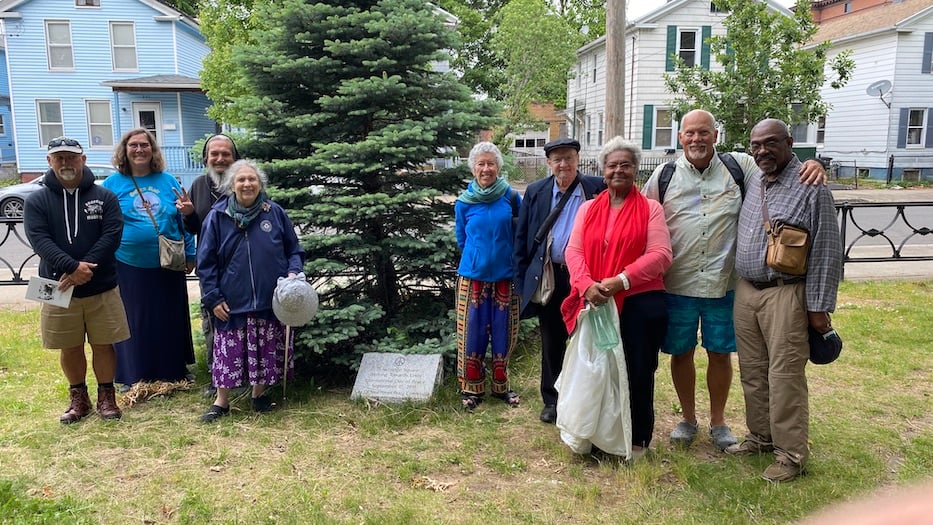
In the Hill, former Alder Dolores Colon recounted how that square was one of the first neighborhoods to have planned residential housing for working-class families. The district is historically significant for its association with Simeon Jocelyn, a white minister and abolitionist who advocated for educational and civil rights for Black Americans and who helped establish the Amistad Committee that supported the freedom of L’Amistad crew.
On a sunny Sunday morning, the Sound School welcomed the Golden Rule and weekend organizers to its Summer Festival. Peace Commissioners Sean Buskey, Grenough and Erica Holahan shared information about the commission, and let people know that the Commission reserved two seats especially for students.
“You mean I can be on the Commission even if I’m just a freshman?” asked a student named Jason. Commissioners happily told him that the answer was yes.
Peter Solomon, coordinator of aquaculture at school, invited Captain Johnston-Kitazawa to share his sailing experiences with nautical-minded students, teachers, and parents.
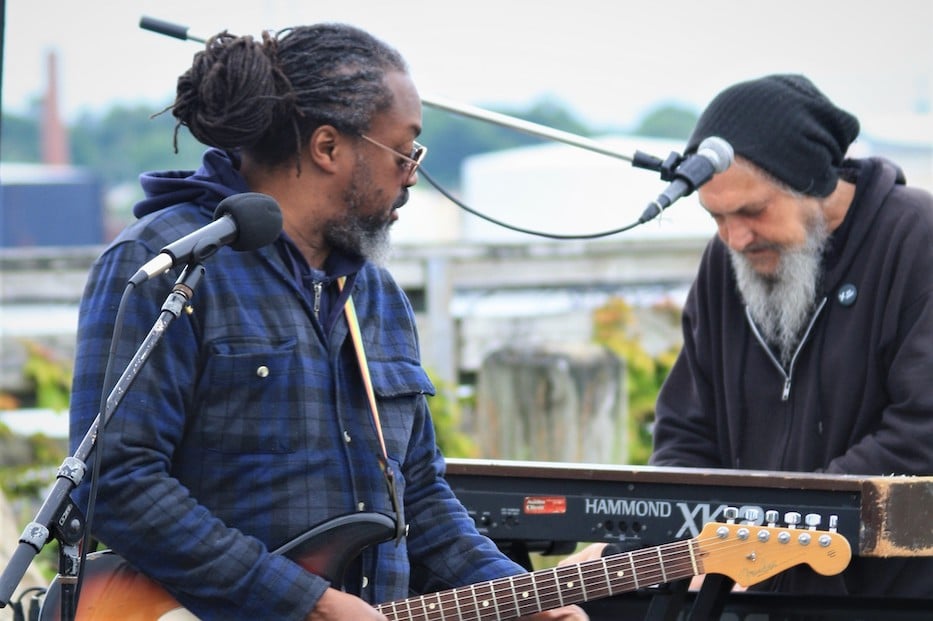
When a teacher asked how he got involved with the Golden Rule, Johnston-Kitazawa explained that his longtime pacifism led him to the boat. When the Golden Rule docked in Hilo, “it caught my eye” for its mission.
“We Hawaiians know more about nuclear weapons than those in the U.S. because so many Japanese lived in Hawaii in 1945,” he said. “ Their relatives were killed. And Hawaiians were told they were going to die from nuclear weapons in 20 minutes from the false alarm.”
Johnston-Kitazawa’s regular gig is teaching people how to sail traditional Hawaiian sailing canoes, he added. He said he was glad to have the chance to come aboard and sail the boat, sharing its mission with the wider public.
After responding to more questions from parents and students, Johnston-Kitazawa rowed from the Sound School back to Long Wharf Pier.“I can get there faster than the people walking,” he joked.
Sure enough, Johnston-Kitazawa got there in time for the afternoon event. Boat-less people drove, walked or biked to the pier to visit the boat and to participate in music and speakers for peace.
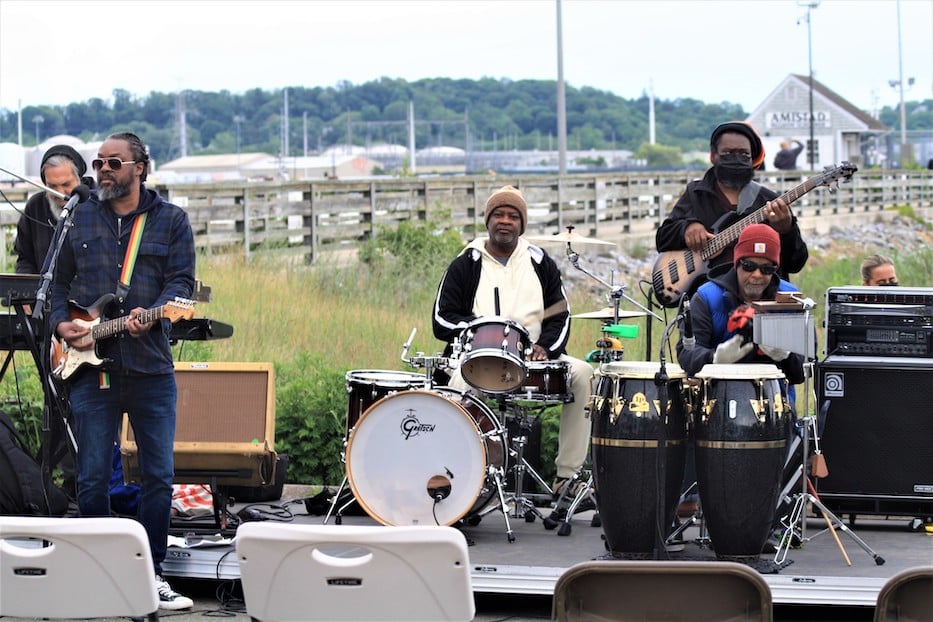
At the pier, New Haven’s Fred “Professor B” Brown tuned up with guitarist Justin Davis in preparation for their performance.
At the same event, Fishman presented an official city proclamation to Jaccard, Condon and crew members, thanking them for “disrupting their own lives to take this journey and for disrupting the policies that bring us and the world so dangerously close to nuclear annihilation.”
Just as Elicker had a day before, Fishman pointed to the referendum where 83 percent of New Haveners called on the federal government to shift funds from military to health and climate and the needs of cities.
“The need is even more urgent today. This visit from the Golden Rule continues to bring us together to make our voices heard in a time of crisis,” she said, inviting attendees to come to the commission’s monthly meetings and seek appointment on the commission, which currently has multiple vacancies.
Peace Commissioner Suzan Henriquez read a special greeting from Alfred Marder, founding member of the Peace Commission, retired President of the International Association of Peace Messenger Cities, and lifelong advocate for peace and social justice.
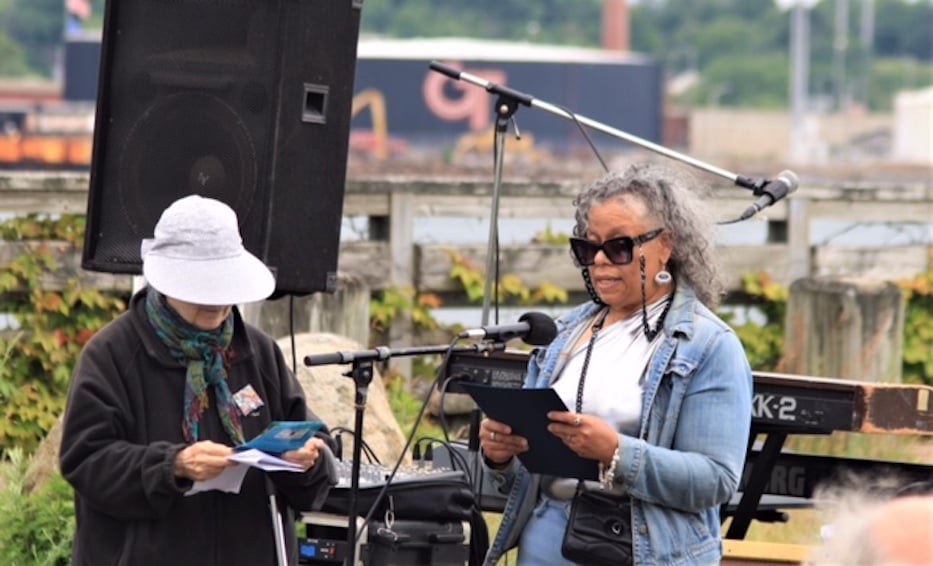
At age 102, Marder was unable to attend physically, but has continued to add spice and wisdom to peace efforts. "The citizens of New Haven, a city designated by the United Nations as a Peace Messenger City, welcome the visit of the anti-nuclear weapons vessel, the Golden Rule … The City of New Haven led by the Peace Commission pledges support for the campaign to abolish nuclear weapons, threat to humanity,” he wrote.
Introduced by Brown, jazz musician, atomic veteran and recent Hartt School graduate Hank Bolden spoke about his experience as a U.S. soldier placed in the area of nuclear testing and its effects on his body over the years.
“I was one of a crew of young soldiers, all Black, who were ordered to pack up for a ‘special military exercise.’ On January 18, 1955, without explanation, we were ordered to march miles into the desert and get into a trench.”
Looking at the other young men surrounding him, he realized they all had two things in common: They were all Black. And none of them had any idea what was coming next.
“They tell you to cover your eyes,” he recalled.
As a result of that “special military exercise, I suffered multiple diseases – damaged cataracts, cancer, all kinds of stuff,” Bolden said. “ In 1990 I was told I had multiple myeloma and I had only four years left to live. Well, I guess I showed them I’m not a statistic. I was in my 50s then and I’m 86 now, and still going strong. I think I’m one of the few remaining ‘atomic veterans.’”
“There’s a kind of sweet irony that the name of the Shot Wasp nuclear bomb that dropped that day was ‘Mark 6’ - and that’s the kind of saxophone I have,” he mused. “ Playing it is sometimes the only thing that gives me peace.”
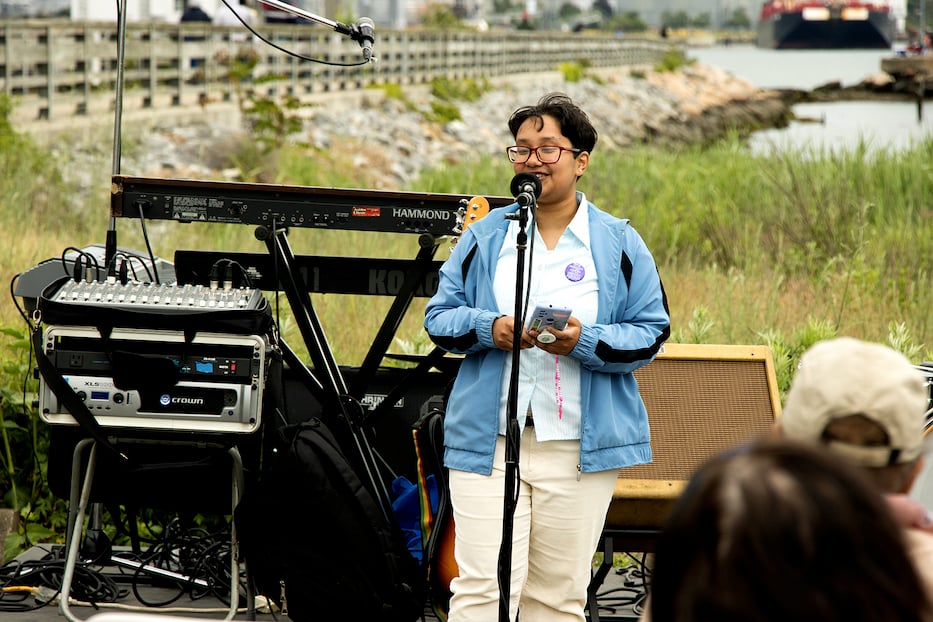
In a gesture that felt symbolic, Bolden turned it over to 20-year-old Tufts University student Adrian Huq, a climate organizer in New Haven and Connecticut more broadly. Thanking attendees and crew members for attending, Huq recalled learning three years ago that $770 billion goes to the U.S. military each year—a fact that they were horrified to sit with.
As they spoke, Huq pointed to the need for demilitarization as part of climate justice. They advocated for a deeply intersectional approach, in which “ climate activists can infuse anti-war views ito their activism.” This, Huq said, takes a stance that fights for both the planet and the people living on it.
“To bring this locally, this year, New Haveners are paying $206 million in taxes towards the federal military,” they said. “ From a climate standpoint, this could have powered all the households in the city with solar electricity for 14 years.”
“Memorial Day last week allowed me to reflect not only the lives of Americans lost while serving in the US military, but also to remember all of the victims of warfare and imperialism worldwide. I hope that the holiday reignited our commitment to work towards a vision that one day, we will no longer need to have soldiers engaging in warfare who become the next generation of veterans.”
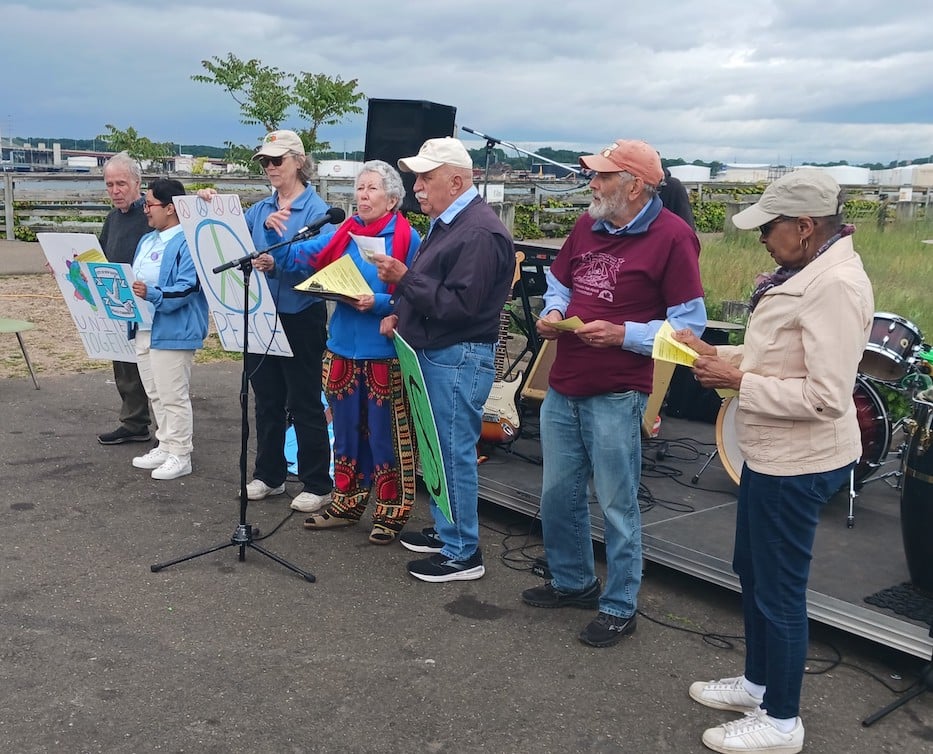
Following Huq’s stirring speech, the group had an opportunity to look out at the broad horizon. Paul Bloom, abbot of New Haven Zen Center, Kimberly Stoner of New Haven Friends Meeting, and Rev. Joshua Sullivan of Christ the Good Shepherd Church added their energetic support to ending nuclear proliferation and war.
Five other faith leaders signed on with their support, including Rev. Robert Bergner of Grace and St. Peter’s Episcopal Church; Rabbi Herbert Brockman and Rabbi Brian Immerman of Congregation Mishkan Israel; Bishop Peter A. Rosazza, and Reverend Heidi Thorsen of Trinity Church on the Green.
Henry Lowendorf, a member of the Veterans for Peace and the Greater New Haven Peace Council, echoed Huq’s words. He said he wants to live in a nation that sustains life rather than destroys it. He called on people at the pier to take action.
“Talk to your local leaders and the people in D.C. If you live in another town, do what we did in New Haven – get your City Council to sponsor a referendum that asks people their opinion,” he said. “ Do you want your tax money spent on weapons? Or on your children?”
The words clearly moved attendees. This author, who leads the Connecticut Peace Singers, praised young activists like Huq as well as the intergenerational coalition gathered at the pier. Just moments later, that message echoed in song:
Does it make any sense to spend our bucks on defense when we can’t pay for our food?
It takes a lot of green to build a submarine – Does another one do any good?
In call-and-response fashion, the Peace Singers invited the group to repeat after them:
Where do we want our green to go? How do we want our taxes spent?
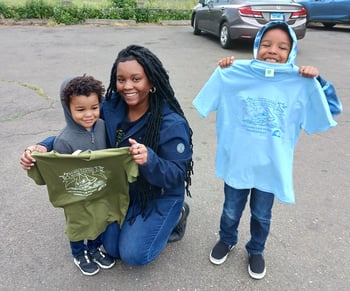
Longtime members of Connecticut Veterans for Peace took the stage next. Jim Brasile served with the Marine Corps in Vietnam; Jim Pandaru was with the U.S. Navy in Vietnam and a Navy Reservist for twenty years after that. Both of them are now grandfathers. In a gesture that lifted up youth at the event, they distributed t-shirts to two of the youngest members of the audience.
“I want to remind parents that the way to a more peaceful future, both foreign and domestically is through education not militarization,” Brasile said. . “And I mean that in caps – education not militarization.”
As the afternoon sun drifted across the Sound, the Inity Reggae Band brought the crowd to its feet with their rendition of “Statue of Liberty.” With Brown on keys, Justin Davis on guitar, Ray Stover on percussion, Robin Setal on bass, and Eric Johnson on drums, the band got the crowd dancing in minutes. The music and speakers for peace ended on a sweet note with people smiling, shaking hands, feeling connected in a fresh way.
A few folks drifted down to take a tour of the Golden Rule. Others hung around to talk more with Bolden, Jaccard and Johnston-Kitazawa. The singers met the newest Golden Rule crew member, a young woman named River (she declined to give her last name)who had just flown in from San Francisco to join the crew on their loop up north.
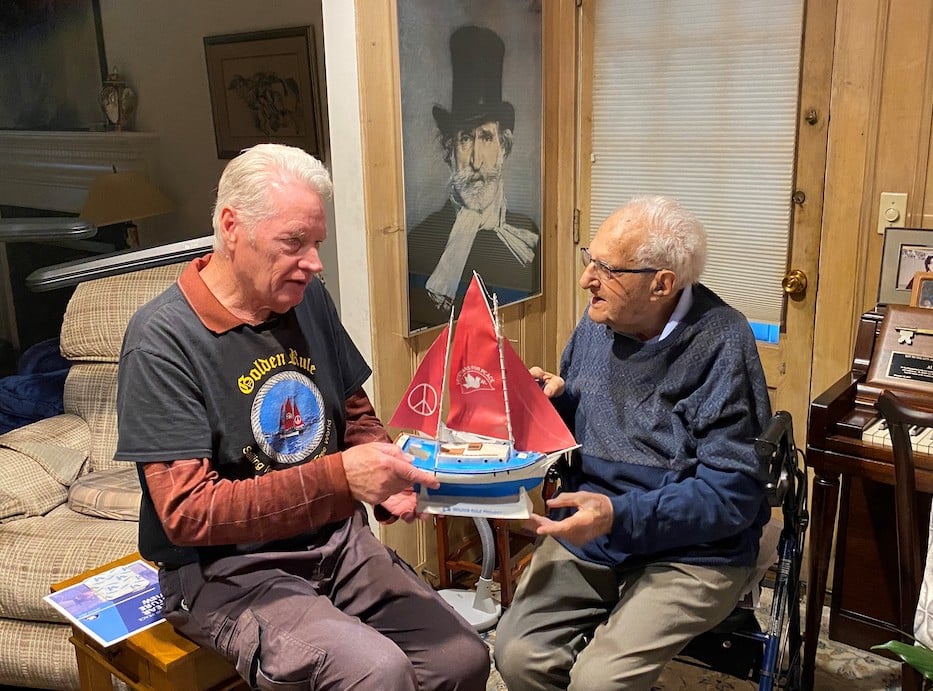 Later that evening, Condon and Jaccard dropped by Marder’s home for a short visit. Because of physical challenges, Marder couldn’t be at any of the events in person, but his spirit infused the entire weekend. He couldn’t get to the ship, so the ship came to him.
Later that evening, Condon and Jaccard dropped by Marder’s home for a short visit. Because of physical challenges, Marder couldn’t be at any of the events in person, but his spirit infused the entire weekend. He couldn’t get to the ship, so the ship came to him.
On the last morning of their long weekend in New Haven, Jaccard visited Metropolitan Business Academy to interact with students and teachers. When asked by a student how she happened to be with the Golden Rule, Jaccard said that she was first inspired by reading Bigelow’s words, and learned more from there.
“It is a way for me to use my abilities as an organizer to work in a tangible and enjoyable way for peace,” she said. She encouraged the students to do what they enjoyed, to deepen their interests, to explore the world.
She returned to the pier in time to see the crew preparing for departure. She met two new members, Chip and Brenda, who were seasoned sailors and are familiar with the water around Essex.
We New Haven landlubber folks were close by, waiting to say goodbye. As we watched the scene unfold, we marveled at the flexibility of the crew, the ease with which they welcomed new participants, how efficiently the job at hand was accomplished. A tangible manifestation of together action accomplishing more than ego aggression. And with such style!
Millie Grenough is a longtime supporter of Veterans for Peace and an active member of the City of New Haven Peace Commission. Although not herself a veteran, her father was wounded three times in the World War in Europe. Millie works as a coach, speaker, and Clinical Instructor in Psychiatry at the Hispanic Clinic, Yale University School of Medicine. She is the author of Oasis in the Overwhelm: 60-second Strategies for Balance in a Busy World.

